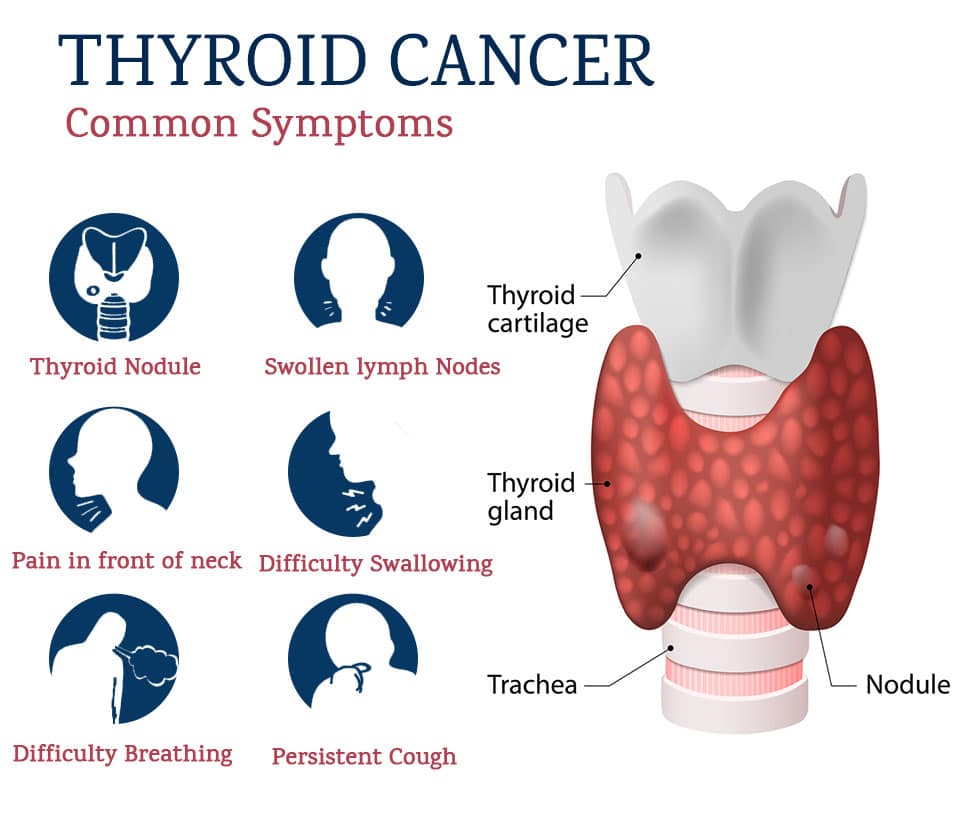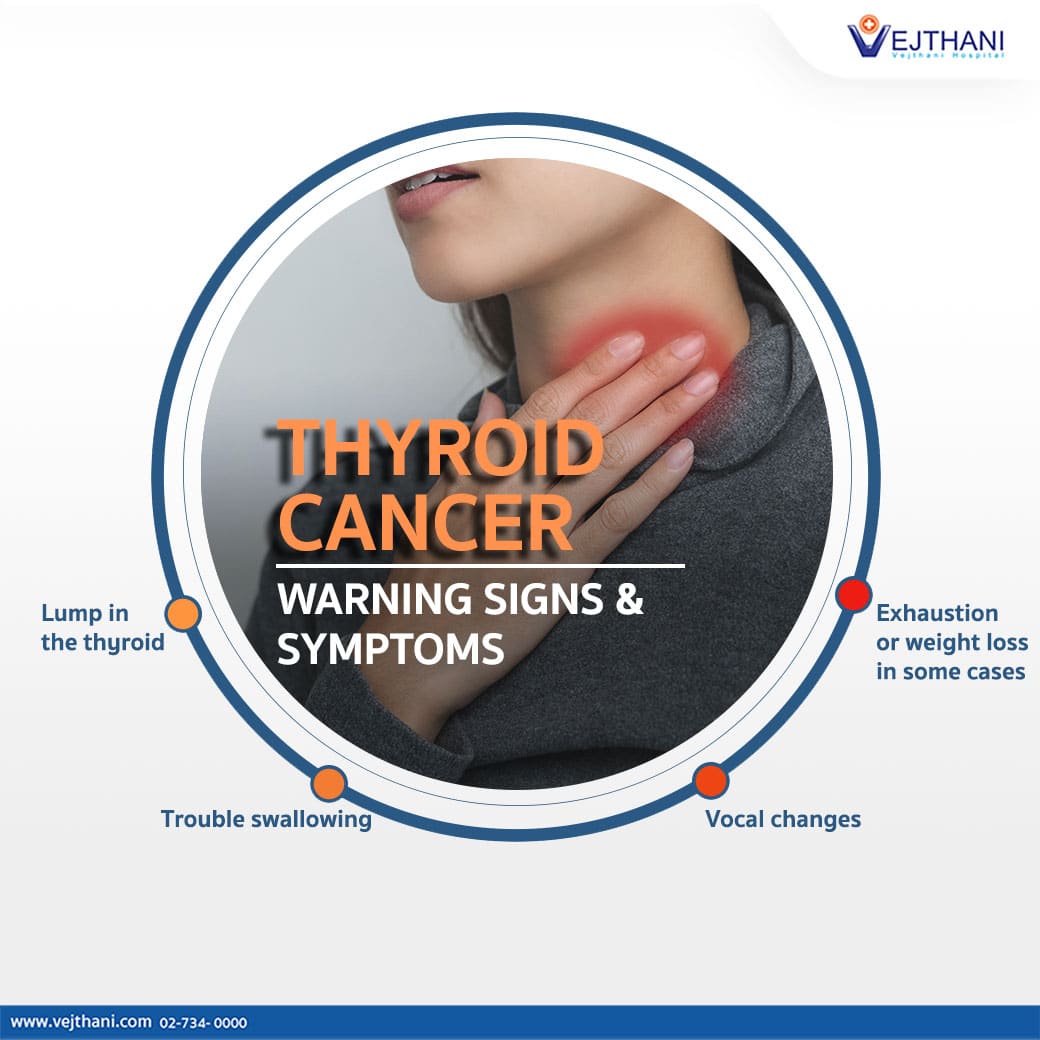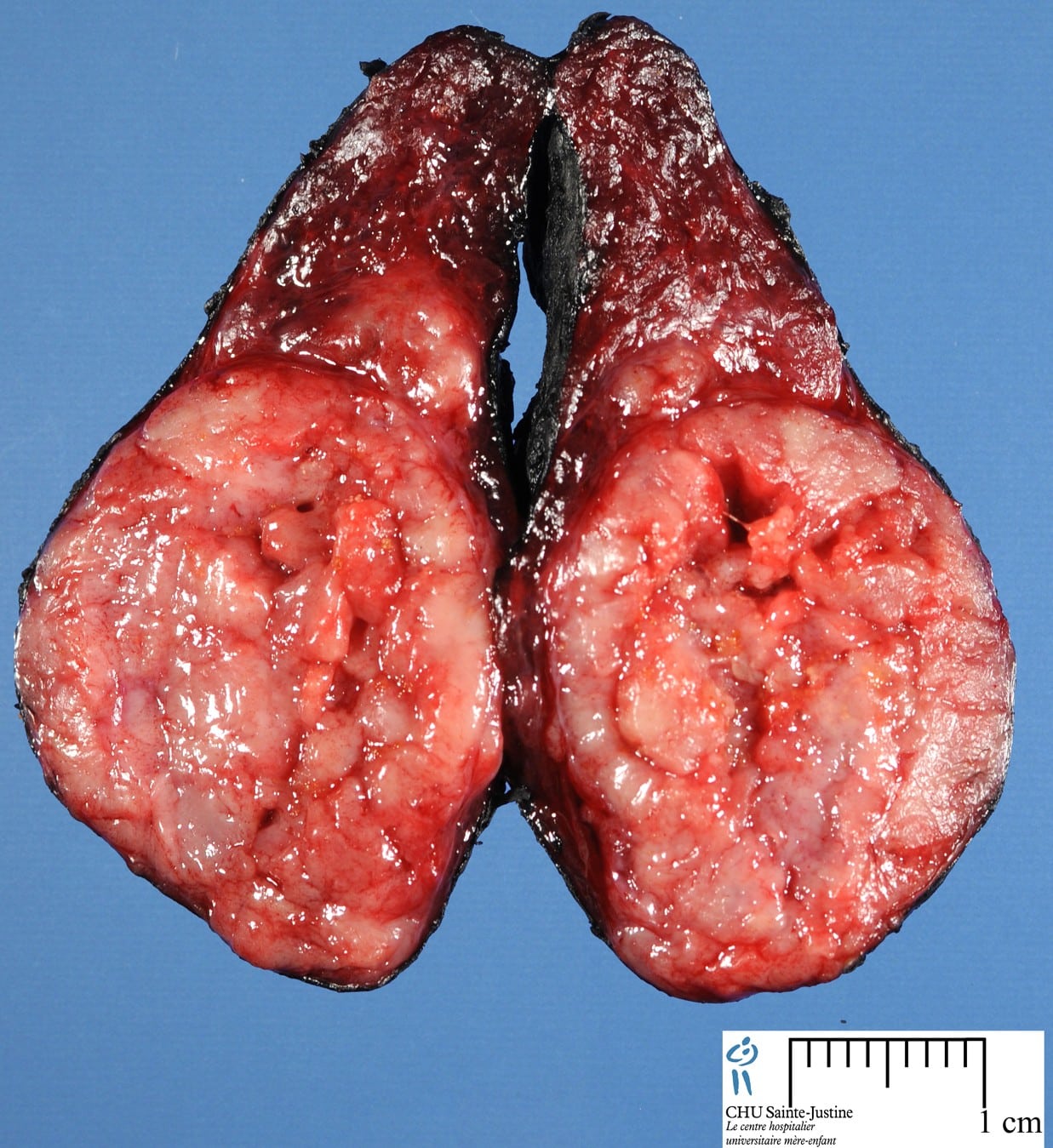Signs Of Thyroid Cancer Include A Swelling Or Lump In The Neck
Thyroid cancer may not cause early signs or symptoms. It is sometimes found during a routine physical exam. Signs or symptoms may occur as the tumor gets bigger. Other conditions may cause the same signs or symptoms. Check with your doctor if you have any of the following:
- A lump in the neck.
- Trouble breathing.
How Doctors Diagnose Follicular Thyroid Cancer
If your doctor suspects cancer, or if you have noticeable symptoms of thyroid cancer, your doctor may order tests.
One possible test is a thyroid ultrasound. An ultrasound can detect any growths within the thyroid. An ultrasound is a noninvasive test that takes only a few minutes and that typically takes place at a hospital or ultrasound facility.
The other typical test is a thyroid biopsy. If a growth is present, a healthcare professional often takes a biopsy from the thyroid to confirm the presence of cancer cells.
Generally, blood tests are not helpful tools for diagnosing thyroid cancer. As the American Thyroid Association explains, this is because thyroid function tests are typically normal, even when cancer is active.
What To Expect From Your Doctor
Your provider is likely to ask you a number of questions. Being ready to answer them may reserve time to go over points you want to talk about in-depth. Your provider may ask:
- When did you first begin having symptoms?
- Are your symptoms occasional or continuous?
- How severe are your symptoms?
- Does anything seem to improve your symptoms?
- Does anything seem to make your symptoms worse?
- Have you ever been treated with radiation therapy?
- Have you ever been exposed to fallout from a nuclear accident?
- Does anyone in your family have a history of goiter or thyroid or other endocrine cancers?
- Have you been diagnosed with any other medical conditions?
- What medications are you currently taking, including vitamins and supplements?
- What have other health care providers shared with you about your condition?
©2022 Mayo Foundation for Medical Education and Research . All rights reserved.
Read Also: Natural Ways To Improve Thyroid
Age Gender And Being Exposed To Radiation Can Affect The Risk Of Thyroid Cancer
Anything that increases your risk of getting a disease is called a risk factor. Having a risk factor does not mean that you will get cancer not having risk factors doesnt mean that you will not get cancer. Talk with your doctor if you think you may be at risk.
Risk factors for thyroid cancer include the following:
- Being between 25 and 65 years old.
- Being exposed to radiation to the head and neck as an infant or child or being exposed to radioactive fallout. The cancer may occur as soon as 5 years after exposure.
- Having a history of goiter .
- Having a family history of thyroid disease or thyroid cancer.
- Having certain geneticconditions such as familial medullary thyroid cancer , multiple endocrine neoplasia type 2A syndrome , or multiple endocrine neoplasia type 2B syndrome .
Follicular Thyroid Cancer Of The 2nd Degree

Each type of malignant lesion of the thyroid gland has its own individual characteristics. Follicular cancer of the thyroid gland of the 2nd degree is caused by the appearance of metastases. At the same time, the size parameters of the neoplasm and the state in which the nearby lymph nodes are located do not play a significant role in determining the degree of the disease.
Recommended Reading: What Can Help An Underactive Thyroid
Injecting Alcohol Into Cancers
Alcohol ablation, which is also called ethanol ablation, involves using a needle to inject alcohol into small areas of thyroid cancer. Ultrasound imaging is used to precisely guide the needle. The alcohol causes the thyroid cancer cells to shrink.
Alcohol ablation may be an option to treat small areas of thyroid cancer, such as cancer that’s found in a lymph node after surgery. Sometimes it’s an option if you aren’t healthy enough for surgery.
Certain Factors Affect Prognosis And Treatment Options
The prognosis and treatment options depend on the following:
- The age of the patient at the time of diagnosis.
- The type of thyroid cancer.
- The stage of the cancer.
- Whether the cancer was completely removed by surgery.
- Whether the patient has multiple endocrine neoplasia type 2B .
- The patient’s general health.
Cancer can spread through tissue, the lymph system, and the blood:
- Tissue. The cancer spreads from where it began by growing into nearby areas.
- Lymph system. The cancer spreads from where it began by getting into the lymph system. The cancer travels through the lymph vessels to other parts of the body.
- Blood. The cancer spreads from where it began by getting into the blood. The cancer travels through the blood vessels to other parts of the body.
Recommended Reading: Thyroid Cancer Percentage Of Survival
Initiating Therapy For Myelofibrosis Based On Risk Assessment
During a Targeted Oncology case-based roundtable event, Rami Komrokji, MD, and participants discussed when to start treatment for patients with myelofibrosis.
CASE SUMMARY
A 68-year-old woman presented to her physician with symptoms of fatigue and abdominal pain lasting 4 months. She also reported increased bruising and unexplained weight loss. Her spleen was palpable 8 cm below the left costal margin. Genetic testing results showed a JAK2 V617F mutation. Bone marrow biopsy results showed megakaryocyte proliferation and atypia with evidence of reticulin fibrosis, and blood smear results revealed leukoerythroblastosis.
Laboratory results
- In your practice:
- What is the trigger to initiate therapy for a patient with myelofibrosis?
- What is the timing to start JAK inhibitor therapy, and how do you choose?
- How does the nature and burden of symptoms influence your decision to initiate JAK inhibitor therapy?
- How important is it to initiate therapy early?
- When do you consider clinical trial enrollment?
RAMI KOMROKJI, MD: How do you start treatment in those patients? What triggers treatment? Is it the disease, patient symptoms, blood count? Do you believe initiation of therapy early is important? Those are all points that we do think of every patient.
TIM NGUYEN, MD: Often the question I have for myself when I see a patient is when do you refer for transplant?
What would be your next step for this patient?
KOMROKJI: What would you do for this patient?
Reference
There Are Different Types Of Thyroid Cancer
Thyroid cancer can be described as either:
- Differentiated thyroid cancer, which includes well-differentiatedtumors, poorly differentiated tumors, and undifferentiated tumors or
Well-differentiated tumors can be treated and can usually be cured.
Poorly differentiated and undifferentiated tumors are less common. These tumors grow and spread quickly and have a poorer chance of recovery. Patients with anaplastic thyroid cancer should have molecular testing for a mutation in the BRAFgene.
Medullary thyroid cancer is a neuroendocrine tumor that develops in C cells of the thyroid. The C cells make a hormone that helps maintain a healthy level of calcium in the blood.
See the PDQ summary on Childhood Thyroid Cancer Treatment for information about childhood thyroid cancer.
You May Like: Rai Dose For Thyroid Cancer
What Are The Different Types Of Thyroid Cancer
There are four types of thyroid cancer:
Pathologists examine the cancer cells under a microscope to diagnose which type of thyroid cancer it is. Thyroid cancers may be:
- Well-differentiated: These thyroid tumors are treatable and often curable. Follicular thyroid cancer and papillary thyroid cancer are well-differentiated cancers.
- Undifferentiated: These tumors are harder to treat. Anaplastic thyroid cancer is a rare, undifferentiated cancer and is the most aggressive type of thyroid cancer.
Certain Factors Affect Prognosis
The prognosis depends on the following:
- The age of the child at the time of diagnosis.
- The type of thyroid cancer.
- The size of the cancer.
- Whether the tumor has spread to lymph nodes or other parts of the body at the time of diagnosis.
- Whether the cancer was completely removed by surgery.
- The child’s general health.
You May Like: What Size Thyroid Nodule Should Be Removed
Causes Of Papillary And Follicular Thyroid Cancer
We do not know what causes thyroid cancer in most people. But there are some things that may increase your risk of developing it. These are called risk factors. Having one or more risk factors does not mean you will get thyroid cancer. And if you do not have any risk factors, it does not mean you will not get cancer.
What Is Cancer Staging

Staging is a way of describing where the cancer is located, if or where it has spread, and whether it is affecting other parts of the body.
Doctors use diagnostic tests to find out the cancers stage, so staging may not be complete until all of the tests are finished. Knowing the stage helps the doctor recommend the best kind of treatment, and it can help predict a patient’s prognosis. There are different stage descriptions for different types of cancer.
This page provides detailed information about the system used to find the stage of thyroid cancer and the stage groups for thyroid cancer, such as stage II or stage IV.
Also Check: Do I Have To Fast For Thyroid Blood Test
What Kind Of Treatment Will I Need
There are many ways to treat thyroid cancer but surgery is the main treatment. The treatment plan thats best for you will depend on:
- The stage of the cancer
- The chance that a type of treatment will cure the cancer or help in some way
- Other health problems you have
- Your feelings about the treatment and the side effects that come with it
Depending on the type and stage of your thyroid cancer, you may need more than 1 type of treatment.
Symptoms Of Other Thyroid Cancers
Rarer types of thyroid cancer have different symptoms. We have more information about the symptoms of medullary thyroid cancer and anaplastic thyroid cancer. These have different symptoms.
We understand that showing any symptoms of what could be cancer is worrying. The most important thing is to speak to your GP as soon as possible. We’re also here if you need someone to talk to. You can:
You May Like: Treatment For Thyroid Cancer That Has Spread To Lungs
Total Or Partial Thyroidectomy
Surgical removal of the tumor and any affected areas is the first-line treatment for follicular thyroid cancer. There is disagreement among medical professionals on whether the entire thyroid or only the affected lobe of the thyroid should be removed in cases where tumors are only found on one side. Whether you have a full or partial removal of the thyroid gland will depend on your specific circumstances and be between you and your healthcare provider.
If the tumor is small and has not spread surgery may be the only treatment you need. If the cancer has spread to any of the lymph nodes in the neck these will also need to be surgically removed and you may need follow up treatments .
If your thyroid is completely removed you will need to take oral medication for the remainder of your life to replace the thyroid hormones your body is no longer able to make.
Following a thyroidectomy most people spend the night in the hospital. You can expect to have some pain, a sore throat and hoarseness following surgery.
The parathyroid glands, glands which play an important part in regulating calcium, are in close proximity or sometimes actually located within the thyroid and can go into shock following surgery. If this happens calcium levels can drop. For this reason your calcium levels are closely monitored and you may be given oral or intravenous calcium following a thyroidectomy.
Treatments For Follicular Thyroid Cancer
Treatment options for follicular thyroid cancer are typically based on your condition, your age, and how advanced the cancer is. These treatment options can include:
- Surgery: The first course of treatment for follicular thyroid cancer is usually a total removal of the thyroid gland and, if affected, nearby lymph nodes. Removal of the entire thyroid is called thyroidectomy. In some cases, such as if the cancer is in a very small area, surgeons may only need to remove part of the thyroid. This is called lobectomy.
- Radiation therapy: If the cancer has spread around the thyroid, or if your doctor suspects that there is a risk of spreading, you may require radiation therapy after surgery to ensure that the cancer cells are treated.
- Chemotherapy: Depending on whether or not the cancer has spread, your doctor may recommend chemotherapy.
- Thyroid hormone replacement therapy: If the thyroid is removed, you will most likely need to take medications to replace the hormones produced by the thyroid. In most cases, you will need to take these medications for the rest of your life.
- Medications: In certain circumstances, a doctor may also provide some medications that can help slow the growth of the cancer.
Following treatment, you will be monitored every 612 months for at least 5 years to ensure that the cancer does not return or to treat it if it does.
You May Like: Dry Skin And Thyroid Medication
What Causes Papillary Thyroid Cancer
Scientists still dont know the exact cause of papillary thyroid cancer, but they have identified risk factors that increase your risk of developing PTC, including radiation exposure and certain genetic conditions.
Radiation exposure and papillary thyroid cancer
The rates of papillary thyroid cancer are higher in people who have a history of exposure to significant ionizing radiation. This exposure could be due to:
- High-dose external radiation treatments to your neck, especially during childhood, used to treat cancer or some noncancerous conditions.
- Radiation exposure from nuclear plant disasters. The Chernobyl nuclear accident in 1986 led to a 3- to 75-fold increase in PTC cases in fallout regions.
Genetics and papillary thyroid cancer
A few genetic conditions are associated with PTC, including:
Only 5% of all papillary thyroid cases are associated with these genetic conditions.
Diagnosis Of Follicular Thyroid Cancer
- The diagnosis of follicular thyroid cancer cannot be made by fine needle aspiration of a thyroid nodule!
- The diagnosis of follicular thyroid cancer in a thyroid nodule can only be obtained by complete removal of the thyroid mass
- The diagnosis of follicular thyroid cancer accounts for less than 10% of all thyroid cancers
- The diagnosis of follicular thyroid cancer is three times more common in women than in men
- The diagnosis of follicular thyroid cancer occurs most commonly above 40 years of age and rarely occurs in children
- Follicular thyroid cancer rarely spreads to lymph nodes
- The diagnosis of follicular thyroid cancer is rarely associated with a history of radiation exposure
Recommended Reading: How To Treatment Thyroid Gland
There Are Different Types Of Treatment For Patients With Thyroid Cancer
Some treatments are standard , and some are being tested in clinical trials. A treatment clinical trial is a research study meant to help improve current treatments or obtain information on new treatments for patients with cancer. When clinical trials show that a new treatment is better than the standard treatment, the new treatment may become the standard treatment.
Because cancer in children is rare, taking part in a clinical trial should be considered. Some clinical trials are open only to patients who have not started treatment.
What Are The Signs And Symptoms Of Pediatric Follicular Thyroid Cancer

Many children will not have any symptoms when they are diagnosed or until the disease has progressed. Follicular thyroid carcinoma is most commonly found as a lump or swelling in the neck.
Parents may notice:
- A change in their childs voice
- The child may complain of neck or throat pain, difficulty breathing, or a lump in their throat when swallowing
Sometimes it is identified only incidentally after a radiologic study of the neck is ordered for another reason and a lesion is seen in the thyroid gland.
Recommended Reading: What Is Thyroid Function Test
Prevention Of Follicular Thyroid Cancer
To reduce the risk of the onset and development of a disease as a rule is possible if a number of simple rules and recommendations of the oncologist are followed. Prevention of follicular thyroid cancer is based on the conduct of a healthy lifestyle.
The recommendations of a specialist include:
- Refusal from bad habits: smoking, alcohol, drugs …
- Maintain your weight within acceptable limits.
- To reconsider the relation to meal. Minimize the consumption of fatty foods, fast food dishes and supermarket products burdened with a large number of “Yeshok”: various stabilizers, emulsifiers, dyes, flavor enhancers and so on. The daily diet should be balanced and rich in vitamins and minerals. Especially the focus in this situation is on iodine-containing products.
- To maintain the level of vitamins and minerals, including iodine, is normal, you can use and pharmacological drugs, regularly drinking their courses.
- It is necessary to avoid the long-term presence of open areas of skin, and the whole body, under direct sunlight. Do not get involved in frequent visits to the solarium.
- It is necessary to protect oneself from radiation. This is especially true when buying a house or apartment. It is worth to choose a more environmentally friendly place.
- It should be regularly consulted by specialized doctors. If the patient has already had cancer, he needs to undergo an X-ray examination and tests every year to monitor the level of hormones in the blood.